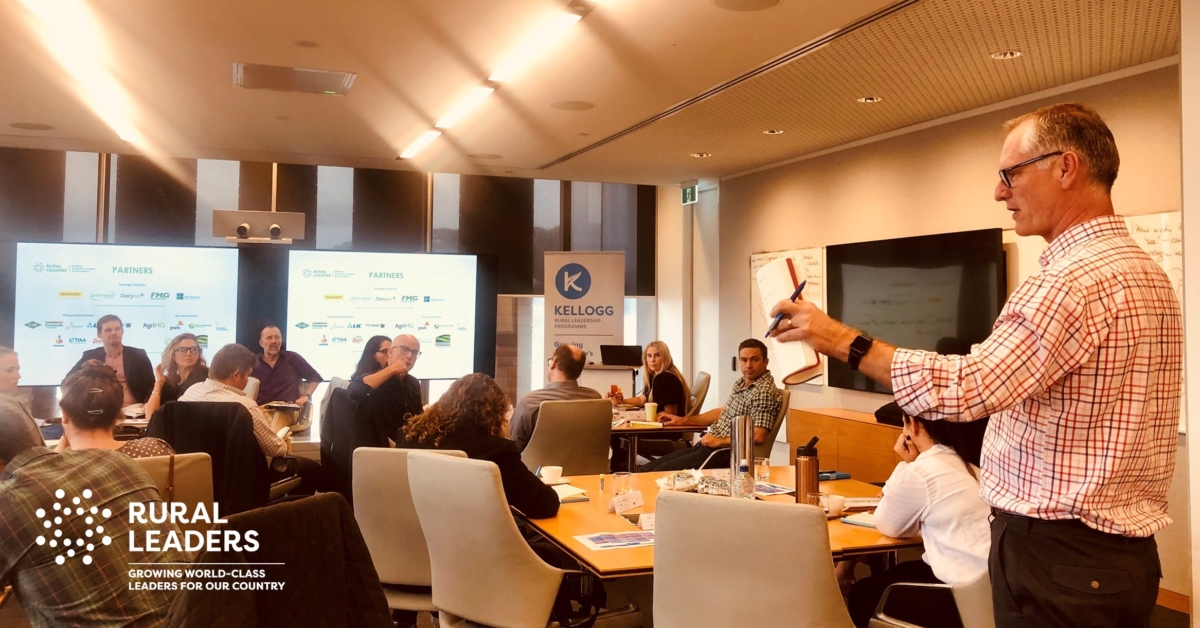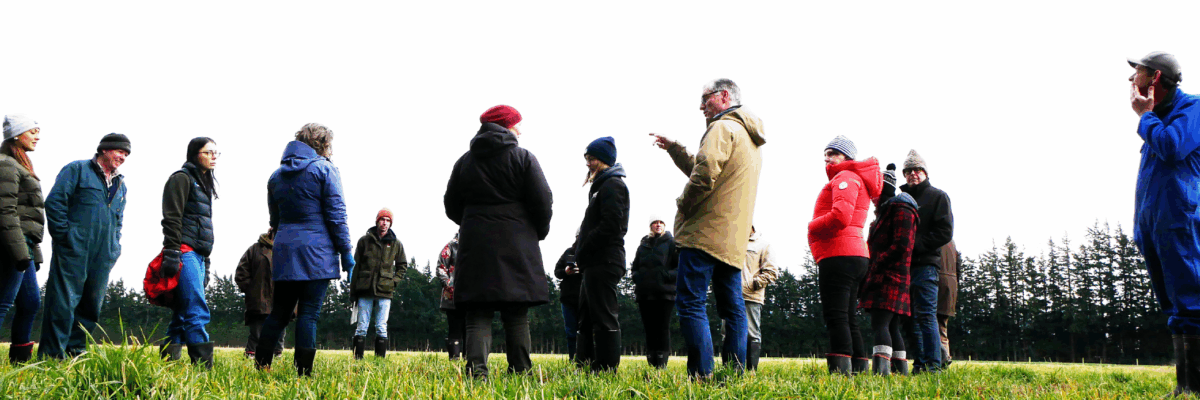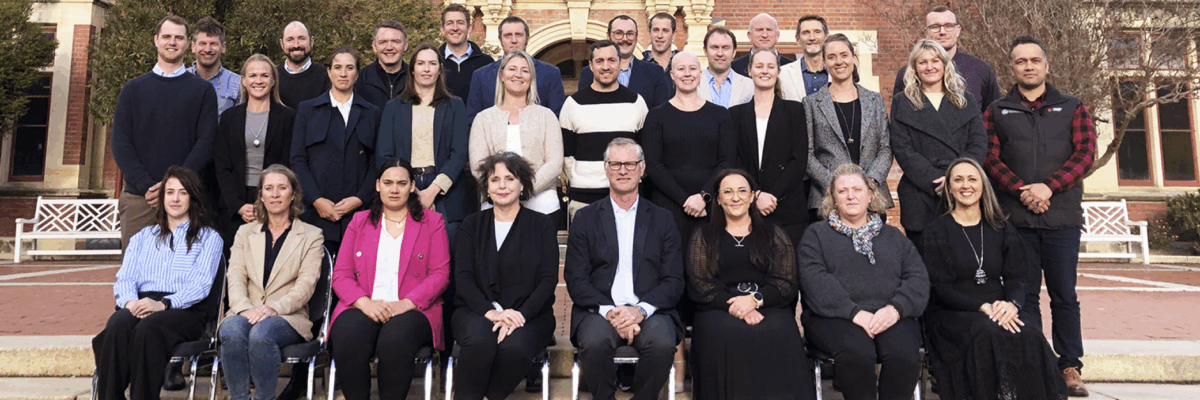
For the last eight years Dr Scott Champion has been a key figure in the development of leaders in food and fibre. He has made a direct impression on over 300 leaders on the Kellogg Rural Leadership Programme and many more through Nuffield, Engage and the HortNZ Leadership Programme.
Scott’s deep sector-wide knowledge, delivery style, ability to deftly weave discussion threads, and tease out insights, has made him one of the sector’s most in-demand facilitators.
As Scott leaves his role with Rural Leaders for a new challenge at Foundation for Arable Research (FAR), we thought we’d take a look at his career so far – one chaptered by key sector roles, research, and developing food and fibre’s leaders.
Foundations in agriculture.
Dr Scott Champion’s journey into agriculture didn’t start in the heartland of rural New Zealand. The story is no less compelling. Raised in Sydney, Scott was drawn to the land from a young age. Family connections to farming in New South Wales sparked an early fascination in the potential of agriculture to sustain humanity in exciting new ways.
His entry into agriculture came at an open day at the University of New South Wales. Scott came across a programme in wool and animal science. He enrolled in the degree, and this soon led to a deep scientific interest, particularly in the relationship between animal nutrition and wool quality. This path took him on to a PhD, which he completed partly in Sydney and partly in Tasmania.
After completing his doctoral studies, Scott moved into teaching and research in animal science at the University of Tasmania. Then in 2001, a new opportunity arose: a product development and research role with the New Zealand Merino Company.

Scott on-farm with a recent Engage Programme cohort.
Science and innovation.
At this time, the New Zealand Merino Company had challenged the long-standing wool auction system, which traditionally kept growers disconnected from brands and consumers. Instead, the company fostered an attribute-based, contract-led supply chain model. The partnership with Icebreaker, one of the company’s earliest and most well-known collaborators, illustrated this shift well. By building direct links between growers and end-users, the New Zealand Merino Company helped brands create compelling product stories while giving growers visibility and value beyond auction prices.
Scott’s science background played a pivotal role in telling the story of Merino wool in new and practical ways. He worked alongside the commercial wool team to deliver training and develop retailer experiences that showcased the performance benefits of Merino, such as moisture absorption and fire resistance, often through live demonstrations. These tactile, science-backed experiences helped redefine how retailers and consumers perceived wool, especially internationally, where traditional wool was often associated with scratchiness and discomfort.
“We thought of ourselves as being an ingredient brand that could sit inside retail brands. So the purpose was not to create a retail brand in its own right around New Zealand Merino, but to create an attribute, an origin story that functioned as an ingredient brand,” says Scott.
the New Zealand Merino Company’s approach, Scott notes, wasn’t just commercial, it was transformational. The company positioned Merino not just as a material, but as an important performance attribute. This shift, from commodity to value-added story, inspired similar approaches across the food and fibre sector.
The CEO.
Scott’s next move was to Beef + Lamb New Zealand (B+LNZ), initially as General Manager of Market Access and Services. The position brought together technical policy, trade access, animal welfare, and red meat promotion; areas that spanned local and international impact. Scott worked on initiatives such as the Five Nations Beef Alliance (which later expanded to seven countries), focusing on improving global trade outcomes for beef.
Later, Scott was appointed CEO of B+LNZ and concurrently led the New Zealand Meat Board, where in addition to strategic oversight, he was responsible for managing farmer reserves and quota access for red meat exports to the US and EU.
Following his tenure at B+LNZ, Scott explored a new direction, founding the consultancy Primary Purpose with a business partner. The consultancy would offer strategic advice and social research across food, agriculture, and natural resources.
Growing rural leaders.
Around this time, Scott’s relationship with the Kellogg Rural Leadership Programme deepened. Having previously been a regular industry speaker on Kellogg, he took on the role of Programmes Director and lead facilitator.
Speaking to Kellogg participants, Scott emphasises leadership is not about titles or standing at the front of the room telling others what to do, it’s more about being in the middle, understanding context, and drawing on lived experience. One of the programme’s unique strengths, he says, is its ability to give people confidence, regardless of their academic background. Participants, some without tertiary education, emerge from the programme with a deeper sense of self and purpose, and an understanding of the broader food and fivre industry.
Kellogg also offers access to influential speakers and one-on-one conversations with senior leaders across government and industry. For many participants, it’s a rare chance to see high-level leadership up close and to realise that those in senior roles are human, facing many of the same challenges anyone else does.
“The convening power of the programme is often underestimated. People are always willing to talk to our Kellogg cohorts. These are people who would have lots of things that they can potentially do in that time slot. I think that’s a mark of Kellogg’s standing”, says Scott.
The long-term impact of Kellogg is increasingly evident, with alumni populating boards, advisory groups, and sector leadership roles. The programme, nearing its 50th year, continues to be a vital part of New Zealand’s rural leadership pipeline.
“As the sector becomes more complex, the need for good leaders who understand context is significant. Not just the narrow technical nature of many of the roles that we all operate in, but that they truly understand the wider context in which they’re operating. I think that’s a key benefit of Kellogg – it’s what makes it so unique”, says Scott.

Scott with Kellogg Rural Leadership Programme cohort 52 (Programme Two 2024)
More to do.
Looking ahead, Scott is set to take on a new challenge. In July, he begins as CEO of the Foundation for Arable Research (FAR), working alongside current CEO, and friend of Kellogg, Dr Allison Stewart through June. FAR is widely respected for its research and extension services in the arable sector, and Scott is looking forward to contributing further.
Meanwhile, Primary Purpose, will continue under the leadership of the partners. The business remains committed to supporting clients with insight-driven strategy and research, helping organisations navigate the complex landscape of agriculture and food production.
From animal science to strategic leadership, Scott Champion’s career has so far been marked by curiosity, innovation, and a desire to give back. His impact has rippled through the primary industries in both Australia and here in New Zealand.
“When done well, applying good leadership can have a hugely exponential impact on the wellbeing and performance of people, teams, communities, industries and on a country. It’s been a privilege to have played a role in developing leaders through Rural Leaders’ Kellogg Programme and I look forward to coming full-circle and returning as a speaker”, adds Scott.
Over the last 8 years, Scott has been an integral part of not only the Kellogg Rural Leadership Programme but Rural Leaders as a whole.
“Scott has brought wisdom, insight and encouragement to all that have attended our Kellogg and Engage programmes. It has always been satisfying to watch the personal confidence and clarity of thought shine through programme participants as Scott guided them through their Kellogg journey. While we are sorry to see Scott move on, we are delighted for him and his new role at FAR”, concludes Lisa Rogers, CEO Rural Leaders.

























